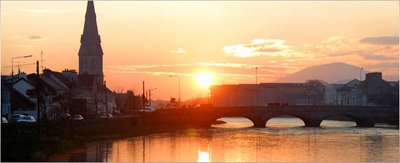First published in the Western People on Monday.
 |
| Bond: Not such an eejit after all |
John Denver was singing about Rocky Mountain Highs on the radio and the big hit show on TV was a thing called The Life and Times of Grizzly Adams. James Adams was unjustly accused of murder by John Q Law and went off to live deep inside the forest with no-one for company except a great big bear called Ben and a man called (appropriately enough) Mad Jack who used to name his donkeys numerically. He had got as far as Number Seven by the time of the show.
There were no bears in the county Mayo at the that time – although I grant that there may have been a few Mad Jacks – and it all seemed so exotic, even on an old black-and-white Pye television set. As such, the chance to see that same wilderness on the big screen of the Savoy Cinema on Tone Street, just down from the current location of the Western People offices, was impossible to resist.
While Grizzly Adams had his troubles during the cowboy era of US history, the Wilderness Family was contemporary to 1970s concerns. But it was close enough, and 100 years is small change in the lives of mountains. If I sat down to watch the Wilderness Family now, it might not seem so magical, but it’d be a mistake to try. Wonder is always at its height during childhood, as it should be.
The Savoy is long gone, leaving not a wrack behind, but in the 1970s it was not the only cinema in Ballina. There was also the Astoria, an old-style cinema and even more wondrous than the Savoy.
Two reasons for this – firstly, there were huge iron gates on the front of the premises, trellised gates that opened and closed like an accordion instead of swinging on hinges. Those gates made a certain impression on duffle-coated eight-year-olds whose imaginations would immediately conclude that those gates were all that stood between the county Mayo and all sorts of Scooby-Doo villains. Many times I piously reflected that it was the grace of God that they were locked away inside there and not roaming the countryside and causing RTÉ to extend Garda Patrol in the light of the special emergency.
Secondly, the Astoria had a balcony. Watching Christopher Reeve’s Superman from the balcony made it feel that you were up there in the air with him, flying around Metropolis (although why he wasted his time with that girl, Lois Lane, was an utter mystery).
The Astoria is long gone now. The Savoy stuck it out for a longer time, with two new movies every week. There were only two channels on that Pye TV set and the Savoy represented a doorway to a different, wholly exotic life that seemed a million miles away from the mean streets of an Irish market town. Every day coming home from Scoil Padraig I’d stop to stare at the posters before dropping into Keohane’s to stop and stare at the no-less-exotic comics.
It’s funny what sticks in your mind. I can vividly remember staring at the poster for Smokey and Bandit, a 1970s comedy starring Burt Reynolds, Sally Field and Jackie Gleeson. Everything Reynolds touched turned to cinema gold then.
I remember the poster for the James Bond movie For Your Eyes Only, where Bond is framed by the extremely long and toned legs of a lady. I wasn’t as bothered with Scooby-Doo at that stage, and thought that Bond, English though he may be, might not be such a fool after all.
The cinema comes into its own for teenagers, as it fulfils two vital teenage social necessities. The first is the intense need to get out the house and meet your friends when you have very little money to spend. And the second is that burning need to spend quality time with that special someone that is counterbalanced by the horrible dread that, the more time he or she spends with you, the more likely he or she is to realise what a drip you are and not at all worthy to lace his or her sandals.
Not only do you not have to talk during a movie, it is positively rude to do so. You only have to sit there. The only slight problem is what movie to go and see in the first place.
For the middle-aged people reading this who grew up in the 1980s, there were only two movies. If you were a boy, it was Top Gun, and if you were a girl, it was Dirty Dancing.
Top Gun is a movie about US air force pilots, and which of them is the best at flying a fighter plane. I have no idea to this day what Dirty Dancing is about but I’ve been told that its principle message is that one should never put a baby in a corner. Sensible advice, but hard to see how it took them two hours to get it across.
The new cinema opened and closed on Convent Hill during my own time away from Ballina. I heard it was an excellent place, but not enough people went to see films there for it to survive. And then I read in last week’s paper that the cinema is to return, and gave a little whoop for joy.
Even in this age of Netflix and torrents and You Tube and blue-ray DVDs there’s still something magical about the dark of the cinema, and the light above your heard shining onto the screen and maybe, on the really good days, someone nice next to you. You’re not talking, but at least you’re there, the two of you, together. Sometimes that can feel like paradise too.




